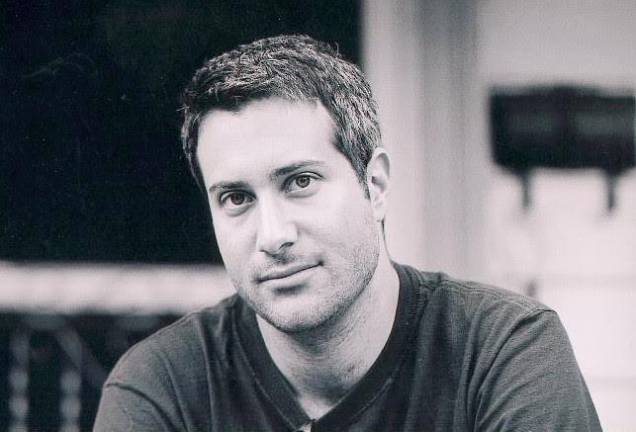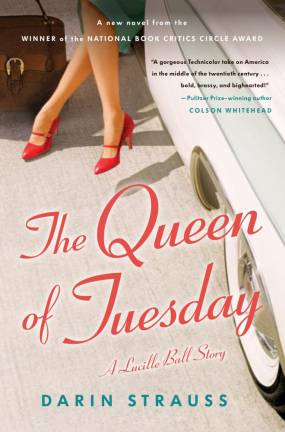Rewriting the History of a New York Businessman & Hollywood Darling
Author Darin Strauss talks penning a fictional affair between his grandfather and Lucille Ball


“I Love Lucy” was so popular that it reached the equivalent of 85 million people per week. To give that statistic some perspective, the biggest network show today is “NCIS,” with a weekly audience of 8 million. In fact, the sitcom was so popular that reservoirs actually dipped in the country at the same time on the nights it aired because viewers were all flushing their toilets during commercial breaks.
In “The Queen of Tuesday,” author Darin Strauss explores the life of Lucille Ball and the numerous barriers she broke during her illustrious career. The redheaded starlet, who only found mainstream success at 40 years old, was the first woman to be at the helm of a TV production company, having greenlit hits such as “Mission Impossible,” “Star Trek,” and “The Untouchables.”
A Long Island native-turned Brooklyn resident, Strauss weaves the life of his own grandfather, New York City real estate developer Isidore, with Ball’s in the mid-20th century, taking readers into the worlds of Hollywood and New York at that time. Dreaming up an affair between the pair, he chooses a Coney Island soiree hosted by Fred Trump, Donald’s father, as the backdrop to their first meeting. As legend has it, both Ball and his grandfather were in attendance that night.
Your grandfather was a big name in real estate in the city. Tell us why you wanted to write about him.
The interesting thing about my grandfather is he had the almost impossible skill of having inherited a bunch of New York skyrises and then still losing everything. I don’t know how it’s possible, but he ended up totally broke when he passed. His father was friendly with Trump’s father and [Samuel] LeFrak and all that. He wanted to be a poet and his father said, “You have to take over the family business.” I was always touched by that because I had wanted to be a writer, and did it, so I always felt like I got to do what I wanted and he didn’t. The other thing I thought was interesting about him was he did these things that most people would think of as sinful and people in my family just forgave him anyway because he was a very sweet guy. Like he left my grandmother for her best friend. And her entire life, my grandmother still called him her husband, even on the day she died, when he hadn’t lived with her for 30 years and had been basically common-law married to her ex-best friend. And he ran the business into the ground, and my father and uncle also were in real estate and they could have helped him save it, but he never offered them a spot in his business.
There are a lot of interesting facts about Lucille Ball in the novel. Tell us about all the firsts that she accomplished.
She was a woman of many firsts. She was the first television superstar, really. It was between her and Milton Berle, but she was bigger and much more beloved. She had the first beloved interracial marriage on TV. You could consider Desi [Arnaz] white, but at the time, the network said it was an interracial marriage and the American people wouldn’t accept it. And she fought really hard to get him on air with her. She was the first person to be shown pregnant on TV. For some reason, it’s really hard to figure out why, network TV thought a pregnant woman shouldn’t be shown on television. By some measures, she was the first woman mogul. There was a woman who was a producer of silent films, but she really was the first big Hollywood executive who was a woman. So all this stuff that I think gets forgotten because we think of her as a housewife because that’s what she played on TV, but she was so much more than that.
The first chapter is set at a party thrown by Fred Trump. Did your grandfather really meet her there?
I heard that was the case, but couldn’t verify it, that’s why it’s a novel. But there was this party, and my grandfather and Lucille both might have been there. So I thought it was a good place to start it. And it was just very cinematic. It’s this party with celebrities and jazz on the beach and romance. Coney Island, which people, I think, also sometimes forget, is kind of the first amusement park in the world. And at the heart of it was this historic, beautiful structure; this giant glass and steel landmark called the Palace of Fun. And Trump Sr. had to tear it down because he was building all this crappy housing. And he knew it would be controversial because it was this beautiful landmark. And so in order to manipulate the press, he threw this big party with a bunch of celebrities there and at the stroke of midnight, they all threw a brick through the glass. I thought that was really interesting and sort of a metaphor for what’s happening with the country now.
As you explain in the book, to Lucille, New York stood for failure. After her divorce, she even returned to the city to star on Broadway, which you wrote about in The Times.
Well she was born in upstate New York and when she was 16, left high school, ran away and took a bus to New York, and didn’t tell her mom. She tried to make it here, and very quickly, was sent home. A producer said to her, “You don’t have it; you’re not talented.” But she kept trying, she ran away something like 10 times. She failed in Los Angeles a bunch too, but of course, she did make it. Even after being the biggest star in the history of American entertainment by some measures, she still felt like she had to prove she could make it in New York. So she came back and tried to do this Broadway play called “Wildcat.” The show was a critical bomb and she kept getting injured, so it didn’t last the whole run. Because she was in it, it was popular while it was on, but it was sort of viewed as a big failure.
You earned an MFA in creative writing at NYU, and now you’re a professor there. Have you been teaching during the quarantine?
Yeah, I taught over the summer remotely, and I’m supposed to go back in in September. We’ll see what happens. I teach one undergraduate class called The Master Writing Workshop, sometimes nonfiction, sometimes fiction. And that’s, I guess, the most advanced class an undergrad can take. Zadie Smith teaches that class too. And then I teach a graduate class for creative writing which is a workshop where we take a book or short story or whatever students are writing at the moment, and try to make it better.
To learn more, follow Darin on Twitter @darinstrauss